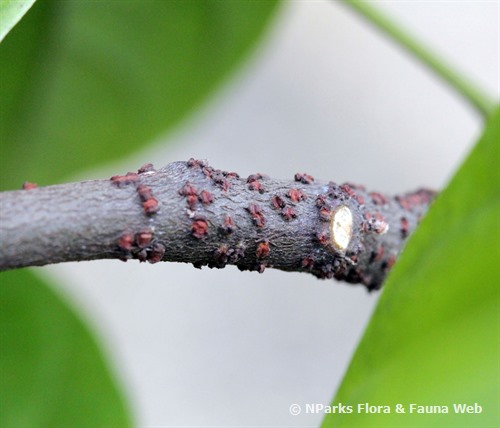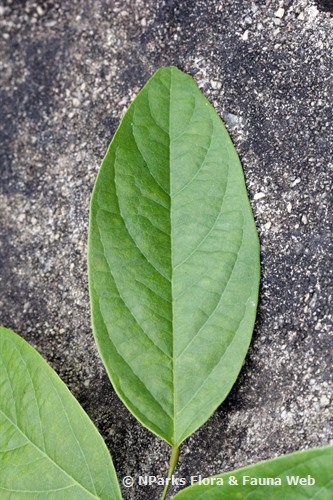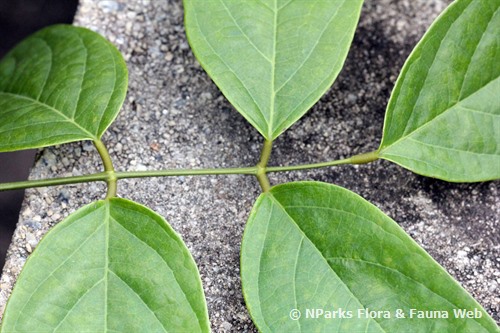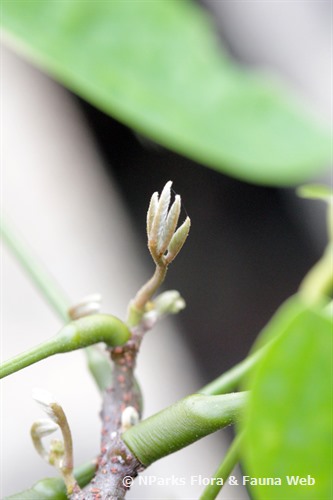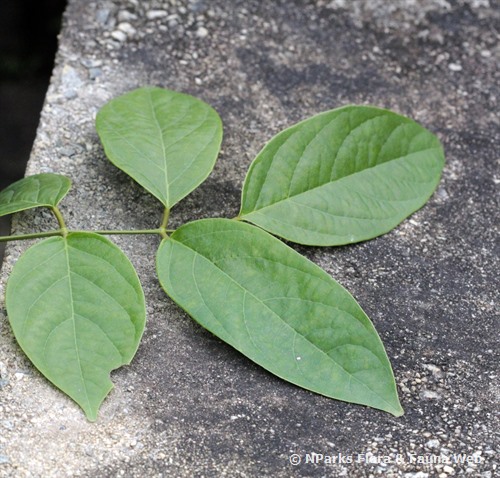
Name
Classifications and Characteristics
| Plant Division | Angiosperms (Flowering Seed Plants) (Dicotyledon) |
|---|---|
| Plant Growth Form | Climber |
| Lifespan (in Singapore) | Perennial |
| Mode of Nutrition | Autotrophic |
Biogeography
| Native Distribution | Peninsular Malaysia, Singapore, Borneo, Sumatra |
|---|---|
| Native Habitat | Terrestrial |
| Preferred Climate Zone | Tropical |
| Local Conservation Status | Native to Singapore (Endangered (EN)) |
Description and Ethnobotany
| Growth Form | A climber which can grow 3 - 12 m high, with stem up to 12.5 cm girth. |
|---|---|
| Foliage | Each leaflet has 5 - 9 leaflets and reticulated margin. The leaflets are elliptic to ovate, sometimes obovate. Leaflet blade is generally smooth, with acute or acuminate apex, and rounded to subcordate base. Terminal leaflet is smooth, 3.5 - 11 cm long and 1.5 - 5 cm wide while leaflets are sparsely to densely pubescent (hairy), more or less symmetrical. |
| Stems | Stems are smooth with small round, wart-like lenticels. Bark is smooth with tiny ridges. |
| Flowers | Panicle inflorescence are brownish to deep black purple or blue black in colour and pubescent. Each papilionate flower has a short pedicel of up to 1.5 mm, sometimes almost sessile. |
| Fruit | Fruits are pods, 8 - 10 cm by 2 cm, yellow brown. Pods are covered with silky brownish hairs. |
| Habitat | Found commonly on hill, blackish soil or stony area, in primary forest. |
| Associated Fauna | Host plant for the caterpillar Hasora schoenherr chuza (Yellow Banded Awl) |
| Etymology | The genus Kunstleria is named in honour of H.H. Kunstler, a plant collector in Malaysia. The specific epithet ridleyi is named in honour of H.N. Ridley. |
Landscaping Features
| Landscape Uses | Trellis / Arbour / Pergola |
|---|
Fauna, Pollination and Dispersal
| Fauna Pollination Dispersal Associated Fauna | Butterfly Host Plant |
|---|
Plant Care and Propagation
| Light Preference | Full Sun, Semi-Shade |
|---|---|
| Water Preference | Moderate Water |
| Rootzone Tolerance | Moist Soils, Well-Drained Soils |
| Propagation Method | Seed |
Foliar
| Foliage Retention | Evergreen |
|---|---|
| Mature Foliage Colour(s) | Green |
| Mature Foliage Texture(s) | Leathery |
| Prominent Young Flush Colour(s) | Green - Light Green, White |
| Foliar Type | Compound (Odd-Pinnate) |
| Foliar Attachment to Stem | Petiolate |
| Foliar Shape(s) | Non-Palm Foliage (Ovate, Obovate, Elliptical) |
| Foliar Venation | Reticulate |
| Foliar Margin | Entire |
| Foliar Apex - Tip | Acute, Acuminate |
| Foliar Base | Rounded / Obtuse, Cordate |
Floral (Angiosperm)
| Flower & Plant Sexuality | Bisexual Flowers |
| Flower Colour(s) | Black, Purple |
|---|---|
| Flower Texture(s) | Velvety / Furry / Tomentose |
| Flower Grouping | Cluster / Inflorescence |
| Flower Symmetry | Bilateral |
| Individual Flower Shape | Papilionaceous / Pea-shaped |
| Inflorescence Type | Panicle |
Fruit, Seed and Spore
| Mature Fruit Colour(s) | Brown |
|---|---|
| Mature Fruit Texture(s) | Papery, Velvety / Furry / Tomentose |
| Fruit Classification | Simple Fruit |
| Fruit Type |
Image Repository
Others
| Master ID | 32258 |
|---|---|
| Species ID | 6666 |
| Flora Disclaimer | The information in this website has been compiled from reliable sources, such as reference works on medicinal plants. It is not a substitute for medical advice or treatment and NParks does not purport to provide any medical advice. Readers should always consult his/her physician before using or consuming a plant for medicinal purposes. |

